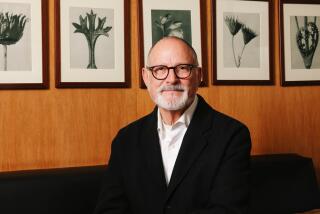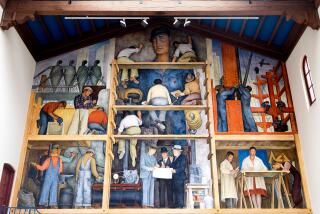L.A. Architect to Lead Sci-Arc
- Share via
Eric Owen Moss, a native son and internationally known architect who has been part of the Southern California Institute of Architecture’s “tradition of non-tradition” since its earliest days in the 1970s, today will take over as director of the school.
Sci-Arc, which moved from Marina del Rey to a former freight depot downtown last year, is counted among the nation’s leading educators of architects, with a reputation for experimentation and close interaction between its faculty of working architects and its student body of about 400 undergrads and graduate students.
Since its beginning, said Moss, Sci-Arc has sought “students who were inventive, self-critical and extremely independent.” Instead of looking for big-name established architects in those first years, Moss said, the school courted “interesting young practitioners who had a lot of energy ... and I’m one of those people.”
Moss, 58, said he will continue in his practice while serving as Sci-Arc director. He has had about 20 projects built in the Los Angeles area, including the Stealth office building in Culver City and the Pterodactyl parking garage and office space in Culver City. (The parking garage is included in the Museum of Contemporary Art’s “What’s Shakin’” exhibition).
In 1999, the American Academy of Arts and Letters awarded Moss its Academy Award for Architecture, placing him among the top practitioners in the United States. Last year, he received a gold medal from the Los Angeles chapter of the American Institute of Architects. In honoring Moss, the academy said that his designs “embody a poetic vision .... The building[s] are resonant and inspiring and, through their inventive presence, they establish a sense of pertinent place.”
Moss was born in Los Angeles to transplanted New York parents. After earning a bachelor’s degree in English at UCLA in 1965, he received a master’s in architecture at UC Berkeley in 1968, and then another master’s degree in architecture from Harvard in 1972. His Culver City-based practice includes 25 employees, who are currently pursuing projects from Queens, New York, to St. Petersburg, Russia. He lives with his wife, architect Emily Kovner, in Pacific Palisades.
Since his return to Southern California in the early 1970s, Moss has been a frequent presence at Sci-Arc, which was founded in 1972, from teaching courses to serving on the institution’s board. After narrowing a list of six candidates to three finalists, the board chose Moss on Jan. 15 to succeed director Neil Denari in the school’s top job. The other finalists consisted of two teams: Craig Hodgetts and Hsin-Ming Fung; and Robert Mangurian and Mary-Ann Ray. Public announcement of his appointment is scheduled for 1 p.m. today, when Moss is to address students at the campus.
Through Moss and board president Ray Kappe describe the school’s decision as a straightforward bid to raise Sci-Arc’s profile and better serve its students, the choice of Moss also represents a return to more familiar personnel after the tumultuous tenure of Denari.
Denari, who took over in 1997, led the school’s relocation to downtown, which has been hailed as a bold, encouraging move by many civic leaders and architects. But he suffered a no-confidence vote among the school’s faculty late last year. Soon after that vote, Denari announced that he would leave the top job by June 2002. When the search for a successor advanced quickly, Denari left the position in December.
In moving the school downtown, “Neil did something that was very good, and very strong and very important,” Moss said. However, Moss added, “the building itself, I think, ought not to remain as historically reverential.... I think it is interesting to take an old train station and bring it back to life in another form. But it’s too finished. I think in some ways, it has to be taken apart again.”
Now that the school is headquartered downtown, Moss added, he sees great opportunities for a student role in the area’s fledgling renaissance.
Ray Kappe, chairman of Sci-Arc’s 18-member board and a founding director of the school, called Moss “a person is not afraid to move things forward.... He’s not short for words, and he’s very expressive, very articulate.... I just feel he will take Sci-Arc up a notch.”
More to Read
The biggest entertainment stories
Get our big stories about Hollywood, film, television, music, arts, culture and more right in your inbox as soon as they publish.
You may occasionally receive promotional content from the Los Angeles Times.











